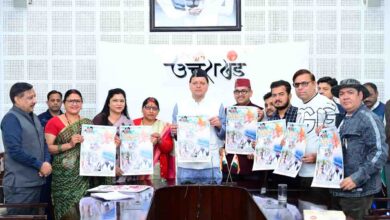We need to tap into our traditions : Dia mirza

TALKTIME
Dia mirza | UNEP National Goodwill Ambassador Mirza speaks with Shalini Saksena about her second term agenda and how our traditional way of living was more eco-friendly than what it is today
What are the programmes that the United Nations Environment Programme (UNEP) runs in the country?
There are multiple programmes that it focuses on but essentially there are four focus areas: Rethink Plastic, Air Pollution, Wild For Life, which is a powerful global campaign. We had tied up with the Ministry of Environment, Forest and Climate Change to run a very impactful campaign on wildlife trade; it is an ongoing campaign. The last part, that it does in other parts of the world as well, is to take science to the people, to the policy makers and Governments. It helps in increasing engagement between the civil society and the Government.
Is there work being done at the private level as well?
A lot of work is being on renewables, engagement with various State Governments on forest protection and sustainable agriculture. There is a robust effort being made by the UN globally to help Governments to recognise the importance to build back after the pandemic — all aspects of growth include Nature, environment and conservation.
What are the changes that you have seen in the last few years?
There have been some wins. But we continue to be challenged by the unfortunate reality that has confronted us for the longest time which is to encourage more Governments, more ministries and policy makers to understand that all infrastructural development can’t happen at the cost of the environment. More emphasis has to be given, more cognizance to environmental assessment impact and flouters need to be strictly hauled up. The unfortunate reality is that most people’s infrastructure perceive environmentalism as obstructionism.
Is there more awareness related to the environment?
We make some gains because more people are aware today of how polluted our air is and what are the measures that can be implemented to clean it up. More people know what plastic pollution is doing to our water bodies, to our soil to our air. But thousands of trees are still being cut and forests cleared. It is a reminder that we are a very small piece of land with home to the second largest population in the world. We just hope that we don’t continue to lose our natural resources in order to build some idea of a future that won’t exist without our natural resources.
Can we only blame the Government for what is happening with the environment?
No, not at all. The good thing is that there has been a lot of emphasis and a lot more progress made on renewables. We made strong strides in solar power generation and making world solar alliance but to actually achieve the extent of measures that we need and the pace at which these have to be implemented you need complete participation and partnership of public, civil society and the Government. Just recently, I was reading about how a few women and children in Uttarakhand hugged trees and prevented them from being cut. When civil society gets up, it can fight the bigger forces.
Do you think that people in urban cities are just as motivated?
Many people recognised how Nature had tried to take back and reclaim what it had lost during the lockdown due to the pandemic. Most people recognised that the air was much cleaner. What is good is that people made the connection between human activity and environment. But we are a very forgetful species as well. However, the younger generation is more empathetic and motivated about change and bringing it in their homes and society one step at a time. There has been unprecedented youth participation in the environment despite the fact that a lot of people working for it have been attacked by the State. This holds a lot of promise.
Can you tell us about some of the initiatives being taken by people in metros?
There is a community of people that I represent that only uses completely toxin-free bleach home-cleaners. This community is growing. There are urban dwellers who recognise that what the mainstream industry is making as cleaners is harmful for the environment. More and more women are switching from regular sanitary napkins to washable cloth or even using the menstrual cup. More and more people are shopping locally and not using plastic.
Is the fact that many think that sustainability is expensive a hindrance?
If see how we co-existed with Nature earlier, whether it was the way we built our homes, the traditional form or architecture, forms of weaving, of making food, of growing food, everything that India has practiced over hundreds of years, you recognise the sense and the merit that our ancestors had in the power of the Earth. All we need is to go back to following systems that we have already have in place. We need to tap into our traditions.






